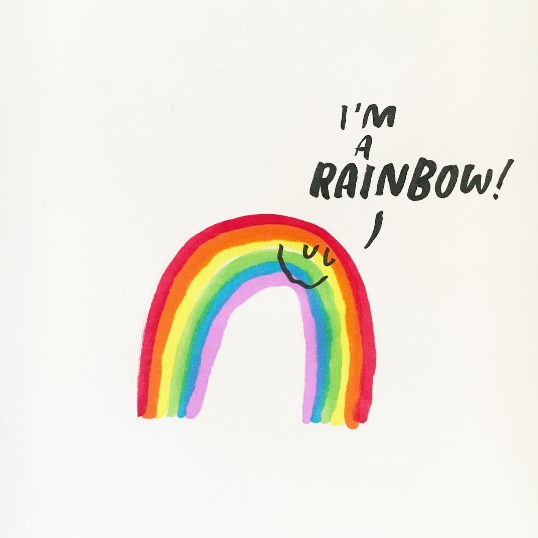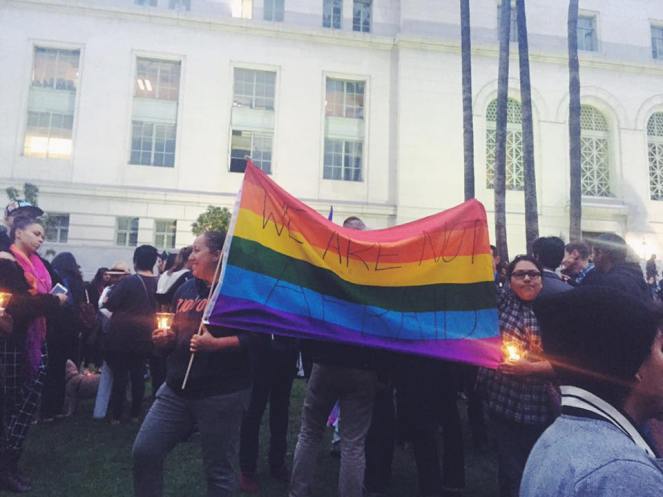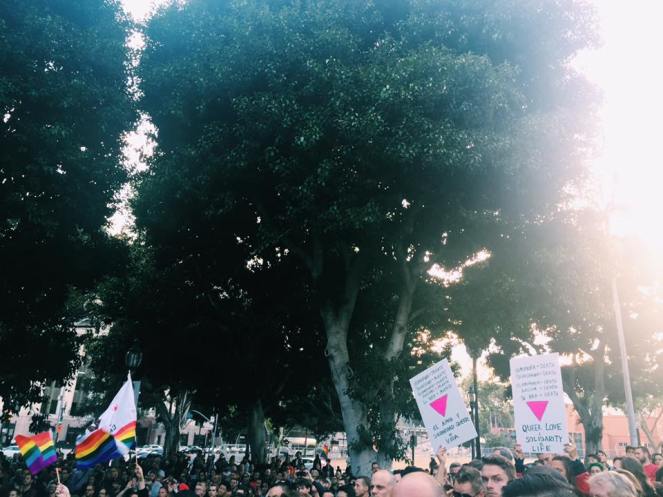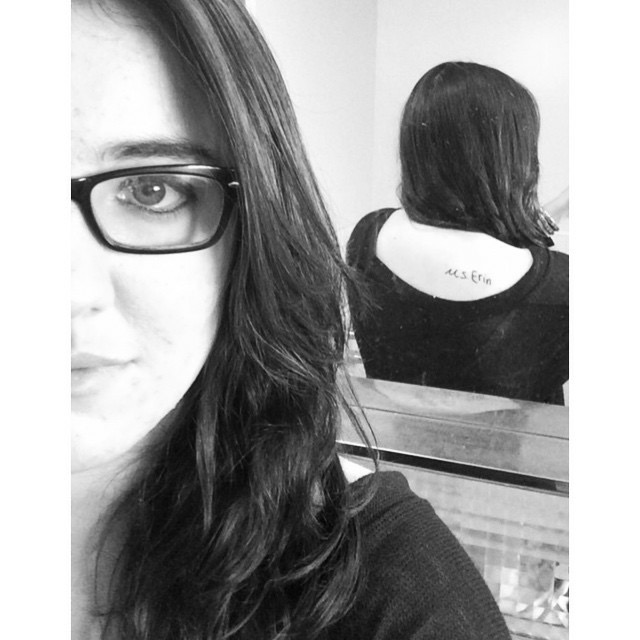
Six years ago at the start of my freshman year of college I met a girl living a few dorms down from me who identified as “bi-curious.” I had no idea what it meant but I was intrigued.
“It means I’m straight but also interested in women,” she said.
Okay, I thought to myself. At that point in my life I had never dated…anyone. Sure I had crushes on boys throughout middle and high school, but once I hit high school I wasn’t exactly what you would call “dating material.” I was 25+ pounds overweight, hiding my body and my extremely low self-esteem behind baggy clothes and jackets and a “straight-A-student/know-it-all” persona in the classroom. I wasn’t an outcast but I wasn’t really popular either, I was just kind of there.
Needless to say, no one was really knocking down my door.
For my entire life (leading up to that conversation in September of 2010), I had always assumed that gender and sexuality were black and white. You were either gay or straight, male or female, etc etc. There was no in-between. After all, everyone in my family and circle of friends was cisgendered, and either gay or straight (although mostly straight). “Bi-curious” or “bisexual” were terms that lived in the far-off undiscovered territory of my brain, and despite my lack of exploration in the dating department I had always assumed that I would like boys.
I believed that being straight was “the norm” and what everyone expected me to be, despite my mom telling me more than once that she would “be fine with it” if I weren’t.
In middle school I had crushed on this one particular guy hard, and for about two years. My first kiss was with a guy. I had an easier time talking to girls and felt self-conscious around guys, which had to be a sign, right?
But then there would be moments when I was 16 and my friends would go on about so-and-so hot male celebrity and I found that I had to force myself to feel “attracted” to him, and pretend to be all gaga over a picture or movie. Even still today, it’s rare that I see a picture of someone and feel an immediate “connection” or whatever (unless it’s Tina Fey, but I digress). I had dreams where I would be in a relationship with a guy, but then the next night with a girl. The first relationship I was ever in was with a guy, at 19 years old, and I started second-guessing it about a month in. I felt jealous of people in relationships who seemed to have their sexuality “all figured out.”
I was confused, but I didn’t realize it.
Needless to say that conversation my freshman year of college blasted me off into reflection, self-education, and a new way of thinking; that it was entirely possible that I could be attracted to two genders (and that the first guy I dated just…wasn’t the right guy).
Five years ago, I realized I was bi.

Since then the journey to figure out who I “really am” has been both liberating and exhausting at the same time; liberating in the sense that I’ve become aware that sexuality is fluid, and just because society wants to place me in a box does not mean that a box is where I belong, but exhausting in that…
…I’ve realized, for me, coming out is not and will never be a “one and done” type of deal. Adopting the identity of a bisexual woman will affect me one way or another for the rest of my life.
In my dating life. In the way people perceive me once they learn this information (and it then becomes my “obligation” to explain it to them). In my family life. In my religious life.
This year, I think, has been the most defining for me as a member of the LGBT+ community. I came out to all of my closest friends, and to my parents. I began to feel comfortable texting my best friend not only every time I saw an attractive guy, but girl too. I changed my Facebook information to publicly say that I was into both men and women (minor, I know, but nonetheless a step forward). I referred to myself as bi in my online writing.
Then the PULSE night club shooting happened in Orlando last June. Guns in general have always frightened me, and I have never wanted to be near one or in possession of one, but this time, after hearing that a man with a gun deliberately attacked people because of who they were and who they loved scared the hell out of me. Because for the first time I realized it could have been my two gay relatives. It could have been one of my former students. It could have been me.
I no longer felt liberated; instead, I wanted desperately to erase all of the progress I had made in my journey of coming out. I felt like there was this part of me that, no matter how much I loved and embraced it, would never be safe in this world. I have only ever (publicly) dated men—three men total—and never once felt afraid to hold their hand in public; at dinner, on the beach, at church. But what if that partner had been a woman? Would we have felt just as comfortable with PDA, or would we ignite a rage so intense that someone would feel justified in killing us? I don’t know. I will never know, and that terrifies me.
After Orlando, I had a family member to whom I am not out say to me:
“I don’t care if someone is gay, just don’t do it in front of me. They shove it in your face. I don’t like that.”
In that moment I felt like I could never trust them with who I really was, and wondered if they said that to all of their straight friends and family too.
I have identified as a Christian long before I ever identified as bi. I was baptized into the Churches of Christ at age 15, without any family with me or ever having gone as a child. Technically, it was “my choice.” It never occurred to me that I would or should have to choose between my sexuality or being part of a church community. But in the nine years since then I’ve had people ask me:
“Why did you join the church if you knew they believe marriage is only between a man and a woman?” (I didn’t necessarily “know” this but let’s also remember that at 15 I’d barely explored my sexuality and assumed I’d be straight. Also a good number of Christians support same-sex marriage, accept that it’s not a choice, etc.).
[Insert question from church here that presumes I can speak for all LGBT+ people]
Did this mean my place at the table with Jesus suddenly became conditional because of who I might love?
Conversely, I’ve had LGBT+ people ask me how I can identify as Christian when [all] Christians are so “hateful,” meanwhile I know that’s not true. It’s a constant “one foot in one door one foot in another” situation that really came to light four months ago, and I will admit I’m still struggling to reconcile.
Like I said, coming out as bisexual has not been a “one and done” type of deal for me. There are so many steps forward that I feel like I made this year, only to be shoved halfway back down the mountain. But it’s a process, and if I could have only one goal it would be to make sure that every single person going through this process knows how brave they are.

It’s not a phase, and it’s not a choice. You are who you are; beautiful, and brave, and a motherf***ing warrior.
And for all of you lovely non-LGBT+ people out there, my advice to you: be a positive, supportive, and safe presence in our lives. Accept and love us for who we are, unconditionally. Create spaces that empower. We appreciate it, more than you know.
We are rainbows, hear us roar.
Love your neighbor as yourself. There is no greater commandment than this. – Mark 12:31

